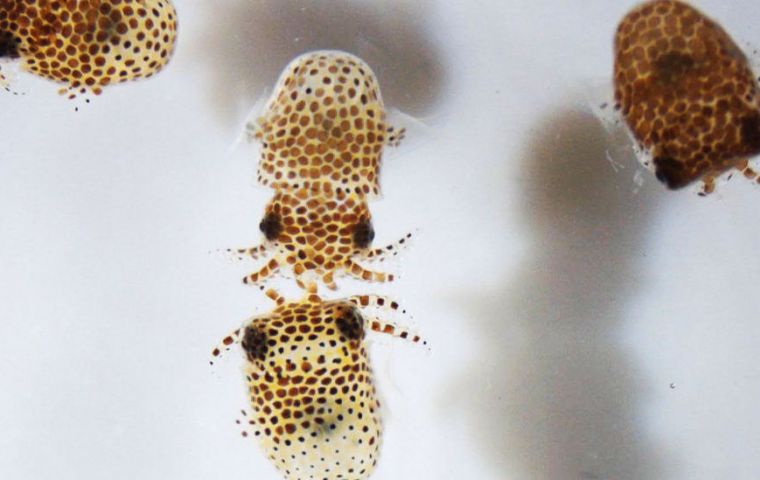MercoPress. South Atlantic News Agency
Baby squid sent to the Space Station for scientific experiments
 NASA sent two boxes with the freshly hatched squids, Euprymna scolopes, to help astronauts study the effects of low gravity (Pic NASA)
NASA sent two boxes with the freshly hatched squids, Euprymna scolopes, to help astronauts study the effects of low gravity (Pic NASA) A resupply mission has reached the International Space Station (ISS) with fresh supplies for the astronauts, including new solar arrays and...for the first time ever two batches of tiny squids for a scientific experiment.
Space agency NASA sent two boxes with the freshly hatched squids, also known as Euprymna Scolopes, to help astronauts study the effects of low gravity on the relationship between the cephalopods and their symbiotic bacteria.
“Animals, including humans, rely on our microbes to maintain a healthy digestive and immune system,” said lead investigator Jamie Foster from the University of Florida.
“We do not fully understand how spaceflight alters these beneficial interactions.”
In addition to the squids, the Dragon capsule was carrying Tardigrades, also known as “water bears” — amazingly resilient microorganisms capable of surviving extreme cold, heat, radiation and pressure.
“Spaceflight can be a really challenging environment for organisms, including humans, who have evolved to the conditions on Earth,” said scientist Thomas Boothby.
“One of the things we are really keen to do is understand how tardigrades are surviving and reproducing in these environments and whether we can learn anything about the tricks that they are using and adapt them to safeguard astronauts.”
NASA used a Falcon 9 reusable rocket to send the animals out to space. The agency is leasing the rocket from SpaceX, a private company owned by tech billionaire Elon Musk.
In addition to live animals and fresh supplies, the mission aims to deliver a new generation of solar arrays to be installed on the ISS. Astronauts will also be testing a new remote control interface with feedback based on virtual reality and touch.




Top Comments
Disclaimer & comment rulesCommenting for this story is now closed.
If you have a Facebook account, become a fan and comment on our Facebook Page!